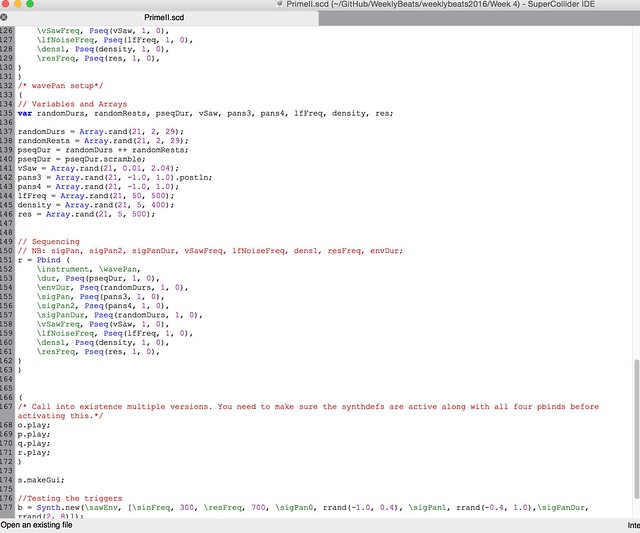Finding myself time-strapped. But I don't labour over the WB adventure at all, so it's not a big deal.
50 March 13, 2016 11:53 pm
Re: 3 Hours Left! (11 replies, posted in General Discussion)
[internal dialogue ~20 minutes ago] Where are the uploads? Oh, I guess GMT doesn't do Daylight Savings... HEY! I get an extra hour a week now!
DST is localised. When my DST ends in a couple of weeks, I will have one less hour to do things. The thing with GMT is that it doesn't vary. My extra hour will end soon. ![]()
51 February 27, 2016 6:20 am
Re: Releases that contain WeeklyBeats 2016 Tracks! (32 replies, posted in General Discussion)
I have released the entirety of Post Hoc Ergo Propter Hoc (Week 7's excerpt).
52 February 22, 2016 10:51 pm
Re: the state of music 2016 (20 replies, posted in General Discussion)
I'm seeing a new opera/multimedia piece in a week or two, by Anthony Pateras, Natasha Anderson, Sabina Maselli, and Erkki Veltheim.
I'll see what else comes around this year.
Well, Another Other was freaking wild.
53 February 9, 2016 7:00 am
Re: Other releases you release concurrent to weeklybeats '16 (9 replies, posted in General Discussion)
Nice (complimentary) idea for a thread.
I've just completed a new piece for low woodwind, a variation (my second variation piece ever) on a piece by an American composer.
Also my week 3 work was not for WB, I just double-dipped.
54 February 7, 2016 11:33 pm
Re: the state of music 2016 (20 replies, posted in General Discussion)
I'm seeing a new opera/multimedia piece in a week or two, by Anthony Pateras, Natasha Anderson, Sabina Maselli, and Erkki Veltheim.
I'll see what else comes around this year.
55 February 6, 2016 5:08 am
Topic: Music (written), programming, and perception (0 replies, posted in General Discussion)
Anybody have any thoughts on the differences in perception (and possibility of perception) between written music and code?
As in, I can read music and perceive what it would sound like when rendered in time. But if there is complex synthesis, I can't do the same with code. This may be a deficit of mine, so I'd be curious to get thoughts.
Also I had a whole post with examples and stuff but can't figure the bbcode out.
56 January 30, 2016 4:13 am
Re: Your process right now (37 replies, posted in General Discussion)
This week: making a SuperCollider patch that is similar to my week 2 one, using less reference material, to solidify my understanding of the syntax in this rudimentary way.
 Screen Shot 2016-01-30 at 3.10.44 pm by Vincent Giles, on Flickr
Screen Shot 2016-01-30 at 3.10.44 pm by Vincent Giles, on Flickr
57 January 19, 2016 1:04 am
Re: Instrumentalists report in! (16 replies, posted in General Discussion)
I am a former bass player. No longer play an instrument other than laptop, but write for instruments somewhat often.
58 January 13, 2016 5:26 am
Re: Typo in filter dropdown (21 replies, posted in Site Help)
That was a typo, I meant hadn't, you space age carpet munchers
It's still wrong. Had is the past-tense of have, so if the statement reads "Music I hadn't listened to yet" then the tenses become mixed: past (had) and future (yet).
59 January 10, 2016 4:32 am
Re: Can someone provide a quick-n-easy guide for music theory? (23 replies, posted in General Discussion)
It's dependent upon tempo, sure. But that doesn't change the structure of the metres under discussion. As I said, subverting those structures is entirely up to the person making the music. Of course people are going to NOT adhere to those structures (and then consider how one might conduct those subversive structures!), imagine how boring music would be if everybody wrote in accordance to these time signatures.
Given the topic of the thread, however, I stand by everything I said and my disagreement with Devieus on the interchangeability of the metres.
60 January 9, 2016 9:57 am
Re: Can someone provide a quick-n-easy guide for music theory? (23 replies, posted in General Discussion)
vinpous wrote:Just a minor addendum to some of the above posts: there is a BIG difference between 6/8 and 3/4. 3/4 has 3x evenly spaced crotchet beats (and is thus a TRIPLE metre), 6/8 has TWO evenly spaced DOTTED CROTCHET beats, making it a DUPLE metre.
You count them like this (the capitals are the emphasis or "down" beat):
3/4 | ONE two three | ONE two three | ONE two three | ...
6/8 | ONE two three FOUR five six | ONE two three FOUR five six | ...
So from that perspective, 3/4 is actually more closely related to 9/8 than to 6/8, because 9/8 has THREE groups of (three) quavers per bar.
9/8 | ONE two three FOUR five six SEVEN eight nine | ONE two three FOUR five six SEVEN eight nine | ...
That's just a technicality. Imagine splitting the bar in half and pretend it's 3/8, then double the note length and half the tempo, you get 3/4. There might be some arcane reason why things don't work that way, but in practice things tend to fall into place either way. One example of which would be a waltz, where every other bar is tapped differently, but still in 3/4.
No it's not.
3/8 has ONE impulse (it's the same as 1/4 time with a triplet instead of a duplet), 6/8 has TWO impulses (the same as 2/4 with triplets instead of duplets), 9/8 has THREE, 12/8 has FOUR, etc.
1/4 has ONE impulse, 2/4 has TWO impulses, 3/4 has THREE impulses, and so on.
The technicality is that you can subvert those all you want, but that doesn't make a single bar of 6/8 the same as two bars of 3/8 or 3/4.
61 January 8, 2016 7:49 am
Re: What genre would you classify yourself as? (36 replies, posted in General Discussion)
vinpous wrote:I am an "art music" composer (ie. classical); most of what I do would be considered "new music" or "experimental music".
i listened to Summer Evening on your soundcloud (had to creep, sorry) what did you use to make that pulsation/growl kind of whistle that took over at the end?
The whole piece was made from a recording I did in my backyard using my phone, and a visual programming environment called Pure-Data. ![]()
62 January 8, 2016 6:14 am
Re: What genre would you classify yourself as? (36 replies, posted in General Discussion)
I am an "art music" composer (ie. classical); most of what I do would be considered "new music" or "experimental music".
63 January 7, 2016 11:44 pm
Re: Can someone provide a quick-n-easy guide for music theory? (23 replies, posted in General Discussion)
Just a minor addendum to some of the above posts: there is a BIG difference between 6/8 and 3/4. 3/4 has 3x evenly spaced crotchet beats (and is thus a TRIPLE metre), 6/8 has TWO evenly spaced DOTTED CROTCHET beats, making it a DUPLE metre.
You count them like this (the capitals are the emphasis or "down" beat):
3/4 | ONE two three | ONE two three | ONE two three | ...
6/8 | ONE two three FOUR five six | ONE two three FOUR five six | ...
So from that perspective, 3/4 is actually more closely related to 9/8 than to 6/8, because 9/8 has THREE groups of (three) quavers per bar.
9/8 | ONE two three FOUR five six SEVEN eight nine | ONE two three FOUR five six SEVEN eight nine | ...
64 January 7, 2016 4:01 am
Re: Can someone provide a quick-n-easy guide for music theory? (23 replies, posted in General Discussion)
One addendum to this is that pentatonic scales are based in equal temperament, and it may well be (I don't know) that bagpipes are not equal tempered, so playing/learning most of this stuff on bagpipes may not actually work very well or might get lost in translation. YMMV etc.
